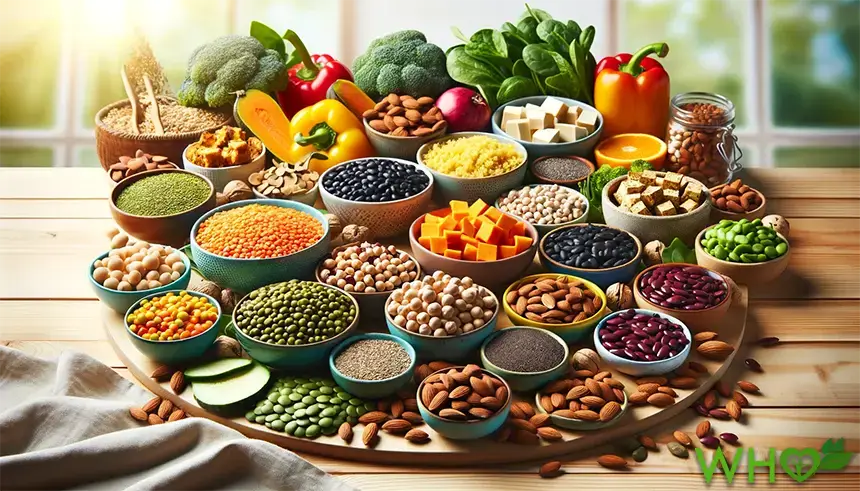In the world of nutrition, few topics garner as much attention and debate as protein. Understanding the benefits of protein is crucial for anyone looking to maintain a balanced and healthy diet. Protein plays a vital role in building, repairing, and maintaining tissues in the body. Whether you’re a fitness enthusiast, a busy professional, or simply someone aiming for better health, Making the right protein source selections can have a big impact. wellhealthorganic Benefits of Protein in Your Diet: How to Choose the Best Sources
Why is Protein Important?
The benefits of protein extend far beyond muscle repair and growth. Protein is composed of amino acids, which are the building blocks of life. There are 20 different amino acids, and nine of these are considered essential because our bodies cannot produce them – they must be obtained from our diet.
Protein is crucial for many bodily functions, including:
- Muscle Repair and Growth:After exercise, especially resistance training, Protein aids in the growth and repair of muscle tissue.
- Enzyme Production:Proteins are involved in nearly every biochemical reaction in the body as enzymes.
- Hormone Regulation:Many hormones, such as insulin, are proteins that help regulate body functions.
- Immune Function:Antibodies, which are crucial for immune defense, are proteins.
- Satiety and Weight Management:One of the significant benefits of protein is its ability to promote satiety, diminishing cravings and hunger. wellhealthorganic Benefits of Protein in Your Diet: How to Choose the Best Sources
Health Benefits of Protein
- Muscle Health and Strength:Consuming adequate protein is essential for maintaining muscle mass, especially as we age. Muscle strength is not only important for physical appearance but also for overall mobility and reducing the risk of injuries. wellhealthorganic Benefits of Protein in Your Diet: How to Choose the Best Sources
- Weight Management:High-protein diets can boost metabolism, increase the number of calories burned, and reduce appetite. A healthy weight can be maintained and weight loss achieved with this combo.
- Bone Health:Contrary to the myth that protein, particularly from animal sources, is harmful to bones, studies have shown that protein intake is beneficial for bone health. It helps increase bone density and reduce the risk of fractures. wellhealthorganic Benefits of Protein in Your Diet: How to Choose the Best Sources
- Improved Metabolism:Protein has a higher thermic effect of food (TEF) compared to fats and carbohydrates. This means that your body uses more energy to digest, absorb, and process the nutrients from protein, boosting your metabolism. wellhealthorganic Benefits of Protein in Your Diet: How to Choose the Best Sources
- Enhanced Recovery:For athletes and those engaging in regular physical activity, one of the key benefits of protein is aiding in quicker recovery from exercise, lowering pain in the muscles and encouraging their repair.
How Much Protein Do You Need?
The Recommended Dietary Allowance (RDA) for protein is 0.8 grams per kilogram of body weight. However, this is a general guideline and may not be sufficient for everyone, particularly athletes, older adults, or those recovering from illness. Protein requirements may rise to 1.2–2.0 grams per kilogram of body weight for people who exercise regularly. wellhealthorganic Benefits of Protein in Your Diet: How to Choose the Best Sources
Plant-Based Proteins
- Legumes:
- Lentils:High in protein and fiber, making them great for digestion and satiety.
- Chickpeas:Versatile for use in salads, soups, and making hummus.
- Black Beans:Packed with protein, fiber, and essential nutrients.
- Nuts and Seeds:
- Almonds:A handful of almonds provides a good amount of protein and healthy fats.
- Chia Seeds:Not only high in protein but also rich in omega-3 fatty acids and fiber.
- Pumpkin Seeds:A nutritious snack with a significant protein content.
- Soy Products:
- Tofu and Tempeh:Both are excellent sources of plant-based protein and can be used in a variety of dishes.
- Edamame:Young soybeans that are great as a snack or added to meals.
- Whole Grains:
- Quinoa:A complete protein that contains all essential amino acids, making it a unique grain.
- Amaranth:Another grain that provides a full amino acid profile.
Tips for Incorporating Protein into Your Diet
- Plan Your Meals:Ensure that each meal contains a source of high-quality protein. This can be a piece of lean meat, a serving of beans, or a dairy product. wellhealthorganic Benefits of Protein in Your Diet: How to Choose the Best Sources
- Snacking Smart:Choose protein-rich snacks such as Greek yogurt, nuts, or a protein smoothie to keep you full and satisfied between meals.
- Mix It Up:Vary your protein sources to get a wide range of amino acids and nutrients. This also makes your diet more interesting and enjoyable.
- Consider Protein Supplements:If you have higher protein needs or struggle to meet your protein requirements through food alone, Think about using protein bars or powders as supplements.
Conclusion :
Understanding the benefits of protein is essential for anyone looking to improve their diet and overall health. Protein is an indispensable part of a healthy diet, offering a myriad of benefits from muscle repair and growth to enhanced metabolism and weight management. By choosing high-quality protein sources and ensuring you get enough each day, you can support your overall health and well-being. Whether you prefer animal-based or plant-based proteins,To fully benefit from this important nutrient, you must include a range of foods high in protein in your diet. wellhealthorganic Benefits of Protein in Your Diet: How to Choose the Best Sources
Disclaimer: This article provides general information only. It is not a substitute for professional medical advice. Always consult with a specialist or your own doctor for more information. This information is not the responsibility of Well Health Organic.


